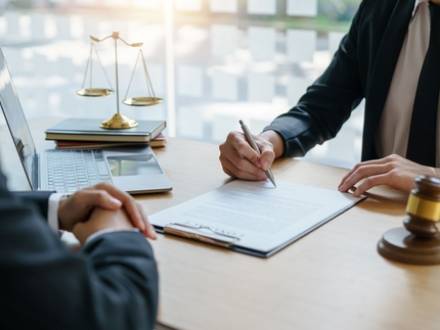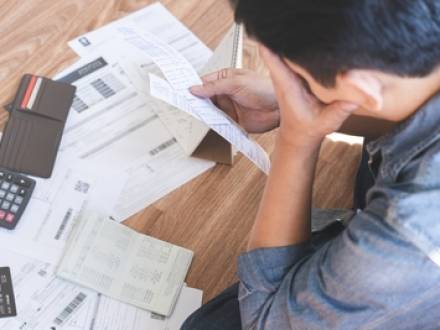Recent Blog Posts
How Can I Start a Business After Bankruptcy in Texas?
 Filing bankruptcy is a legal solution that can help reset your financial life. However, this fresh start comes with certain trade-offs. Bankruptcy affects the filer’s credit score and can temporarily impact his or her ability to obtain lines of credit. Chapter 13 bankruptcy appears on a filer’s credit for seven years, and Chapter 7 for 10 years.
Filing bankruptcy is a legal solution that can help reset your financial life. However, this fresh start comes with certain trade-offs. Bankruptcy affects the filer’s credit score and can temporarily impact his or her ability to obtain lines of credit. Chapter 13 bankruptcy appears on a filer’s credit for seven years, and Chapter 7 for 10 years.
Therefore, some aspiring entrepreneurs who are overwhelmed with debt and are considering bankruptcy wonder whether it will affect their ability to start a business. The good news is that bankruptcy does not stop you from being able to start a new venture, though it may present unique challenges to bankruptcy filers. The best way to plan how to launch a business after bankruptcy is to consult a Texas bankruptcy attorney who can help you understand how Chapter 7 or Chapter 13 can affect your entrepreneurial goals.
How Do Homestead Exemptions Protect My Property During Bankruptcy?
 One of the most common concerns debtors have when filing for bankruptcy is what happens to their assets. Filers often worry that their personal belongings, furniture, cars, and homes may be in jeopardy of being sold to pay off creditors. However, Texas law offers fairly liberal exemptions for bankruptcy filers that allow them to keep certain assets. The homestead exemption, for example, protects a filer’s property against creditors throughout bankruptcy. This exemption is subject to provisions, however, which is why you should consult a Texas bankruptcy attorney about how you can best protect your assets while discharging your debts.
One of the most common concerns debtors have when filing for bankruptcy is what happens to their assets. Filers often worry that their personal belongings, furniture, cars, and homes may be in jeopardy of being sold to pay off creditors. However, Texas law offers fairly liberal exemptions for bankruptcy filers that allow them to keep certain assets. The homestead exemption, for example, protects a filer’s property against creditors throughout bankruptcy. This exemption is subject to provisions, however, which is why you should consult a Texas bankruptcy attorney about how you can best protect your assets while discharging your debts.
What Is the Texas Homestead Exemption?
The Texas homestead exemption gives people who file for bankruptcy unlimited protection for the equity in their homes. Equity refers to the portion of a property that the owner has paid off and therefore owns. For example, if your home is worth $500,000 and you owe $200,000 on the mortgage, your equity in the home is $300,000.
What Can I Keep if I File Bankruptcy?
 Bankruptcy is a tool that helps people escape overwhelming debt, but that does not mean creditors are not entitled to repayment. When someone files Chapter 7 bankruptcy, the debtor’s assets are liquidated to pay creditors. Many borrowers who are considering bankruptcy assume all their assets are subject to liquidation, but this is not the case.
Bankruptcy is a tool that helps people escape overwhelming debt, but that does not mean creditors are not entitled to repayment. When someone files Chapter 7 bankruptcy, the debtor’s assets are liquidated to pay creditors. Many borrowers who are considering bankruptcy assume all their assets are subject to liquidation, but this is not the case.
Texas law offers exemptions for certain assets, which means a bankruptcy filer is entitled to keep some possessions. For more details and to discuss your bankruptcy needs, reach out to a qualified Texas bankruptcy attorney.
What Is the Asset Exemption Law in Texas?
Texas is known for its generous asset exemption laws that allow bankruptcy filers to maintain a certain standard of living even as their possessions are liquidated. Filers can keep specific essential assets up to a defined value with the following exemptions:
What Happens at a Creditors Meeting During Bankruptcy?
 A person who files for bankruptcy is required to attend a 341 meeting of creditors, also referred to as a creditors meeting. The purpose of the meeting is to allow the creditors, the debtor, and the trustee to discuss the debtor’s financial situation and the details of the bankruptcy case. Understanding what a creditors meeting is and what to expect can help you prepare appropriately. Consult a qualified Texas bankruptcy attorney who will walk you through the steps and guide you through your bankruptcy case.
A person who files for bankruptcy is required to attend a 341 meeting of creditors, also referred to as a creditors meeting. The purpose of the meeting is to allow the creditors, the debtor, and the trustee to discuss the debtor’s financial situation and the details of the bankruptcy case. Understanding what a creditors meeting is and what to expect can help you prepare appropriately. Consult a qualified Texas bankruptcy attorney who will walk you through the steps and guide you through your bankruptcy case.
What Is a Bankruptcy Trustee?
After a debtor files for bankruptcy, the court appoints a neutral third party called a trustee to ensure the filer’s debts are paid to the creditors as required. The trustee’s specific duties vary depending on the type of bankruptcy:
What Happens to Repossessed Property in Bankruptcy?
 When a person fails to pay certain secured debts, creditors may seize that person’s property in a process called repossession. Sometimes a lender might repossess a car or a boat if its owner fails to pay it off; when a house is repossessed, it is called "foreclosure." The creditor can then liquidate the property by selling it and make up for the outstanding debt.
When a person fails to pay certain secured debts, creditors may seize that person’s property in a process called repossession. Sometimes a lender might repossess a car or a boat if its owner fails to pay it off; when a house is repossessed, it is called "foreclosure." The creditor can then liquidate the property by selling it and make up for the outstanding debt.
But what happens if the borrower files for bankruptcy? Bankruptcy can affect repossession in various ways, depending on whether it is Chapter 7 or Chapter 13. To learn how bankruptcy might affect your property, consult a Texas bankruptcy attorney with knowledge about repossession.
How Does Chapter 7 Bankruptcy Affect Repossession?
In Chapter 7 bankruptcy, some of the borrower’s assets may be liquidated and used to pay off debts. Here is how Chapter 7 can affect the repossession of the filer’s property:
How Does Bankruptcy Affect Divorce in Texas?
 Bankruptcy and divorce are two life events that can have major impacts on your finances. Depending on your timing, filing bankruptcy can affect divorce. One of the main reasons for this is that bankruptcy is designed to pull you out of debt while divorce can burden you with more. The debt division part of the divorce process, for example — where the court distributes marital debt between the parties — can be affected by bankruptcy.
Bankruptcy and divorce are two life events that can have major impacts on your finances. Depending on your timing, filing bankruptcy can affect divorce. One of the main reasons for this is that bankruptcy is designed to pull you out of debt while divorce can burden you with more. The debt division part of the divorce process, for example — where the court distributes marital debt between the parties — can be affected by bankruptcy.
If you are considering bankruptcy while also facing a divorce, it is important to understand how the two can intersect. It is also crucial to realize that your timing in filing bankruptcy can impact the divorce process. Consult a Texas bankruptcy attorney for more details and legal assistance with your bankruptcy.
When Should I File Bankruptcy if I Am Facing a Divorce?
There are two options when planning bankruptcy around divorce:
What Are the Risks of Bankruptcy Alternatives?
 People often recoil when they hear the word "bankruptcy." They think of the impact on their credit report and their ability to take out loans. Filing for Chapter 7 or Chapter 13 bankruptcy is seen as a last resort for Texans struggling with debt, an option to be considered only after exploring alternatives.
People often recoil when they hear the word "bankruptcy." They think of the impact on their credit report and their ability to take out loans. Filing for Chapter 7 or Chapter 13 bankruptcy is seen as a last resort for Texans struggling with debt, an option to be considered only after exploring alternatives.
These alternatives, however, carry their own risks. Debt relief options like debt settlement or consolidation can have significant downsides. This article will discuss the risks of such bankruptcy alternatives. For more details or any questions about bankruptcy, speak with an experienced Texas bankruptcy attorney.
What Are the Pitfalls of Bankruptcy Alternatives?
The first step toward choosing how to deal with your debt is understanding your options and their risks. For example:
- Debt settlement: There are companies that negotiate with creditors to reach a debt settlement on behalf of the debtor. Sometimes, this entails the borrower paying the creditor a lump sum, usually for less than the original amount owed. However, debt settlement will still significantly hurt your credit score, and you may have to pay high fees. Furthermore, the amount of debt that is forgiven often becomes taxable.
Will My Doctors Still Treat Me After Filing Bankruptcy?
 Medical bankruptcy is not a specific type of bankruptcy; rather, it is an informal term used when bankruptcy discharges debt incurred from medical-related injuries and illnesses. About 56 percent of American adults have some medical debt, and almost a quarter owe more than $10,000 to doctors and hospitals. For those whose injury or illness has led to the loss of a job, the issue is even more critical.
Medical bankruptcy is not a specific type of bankruptcy; rather, it is an informal term used when bankruptcy discharges debt incurred from medical-related injuries and illnesses. About 56 percent of American adults have some medical debt, and almost a quarter owe more than $10,000 to doctors and hospitals. For those whose injury or illness has led to the loss of a job, the issue is even more critical.
Many people use credit cards to pay medical debt and because of the high interest rates are then unable to pay their credit cards. Some homeowners may even take out a second mortgage on their home to keep up with medical debt. Medical debt is not the same as other debt. No one chooses to be diagnosed with a serious illness or to be involved in an accident that leaves them severely injured.
What Are the Limitations of the Automatic Stay in Bankruptcy?
 When someone files for bankruptcy in Texas, they trigger a law in the U.S. Bankruptcy Code referred to as the automatic stay. This federal regulation protects the bankruptcy filer against creditors and takes immediate effect when he or she files for Chapter 13 or Chapter 7. It gives the debtor some respite and breathing room throughout the bankruptcy proceedings.
When someone files for bankruptcy in Texas, they trigger a law in the U.S. Bankruptcy Code referred to as the automatic stay. This federal regulation protects the bankruptcy filer against creditors and takes immediate effect when he or she files for Chapter 13 or Chapter 7. It gives the debtor some respite and breathing room throughout the bankruptcy proceedings.
However, the automatic stay is not a catch-all solution that safeguards the debtor against all creditor claims. This article will discuss what the automatic stay is and its limitations. If you are considering filing for bankruptcy or you want more information about the process, contact an experienced Texas bankruptcy attorney.
What Is the Automatic Stay?
According to Section 362 of the U.S. Bankruptcy Code, the automatic stay is an injunction that goes into effect as soon as someone files for Chapter 7 or Chapter 13 bankruptcy. It stops creditors from pursuing their claims against the debtor while the bankruptcy proceedings take place. If the case is dismissed, the automatic stay ceases to be in effect.
How Long Do I Have to Wait to Buy a Home After Bankruptcy?
 Bankruptcy is a last resort option to pull yourself out of major debt. The reason it is a last resort is that it is still a major financial setback that can affect your ability to take on other debt like car loans and mortgages. However, your options are not limited forever. Depending on the lender and the type of bankruptcy that is discharged, you will be able to take out a mortgage for a home after a certain waiting period. This article will discuss what those waiting periods are and how to contact a Texas bankruptcy attorney who can walk you through your options.
Bankruptcy is a last resort option to pull yourself out of major debt. The reason it is a last resort is that it is still a major financial setback that can affect your ability to take on other debt like car loans and mortgages. However, your options are not limited forever. Depending on the lender and the type of bankruptcy that is discharged, you will be able to take out a mortgage for a home after a certain waiting period. This article will discuss what those waiting periods are and how to contact a Texas bankruptcy attorney who can walk you through your options.
How Long Is the Waiting Period to Buy a Home After Bankruptcy?
The amount of time you need to wait to take out a mortgage after your debts are discharged through bankruptcy depends on the type of bankruptcy and the type of lender. For example:






